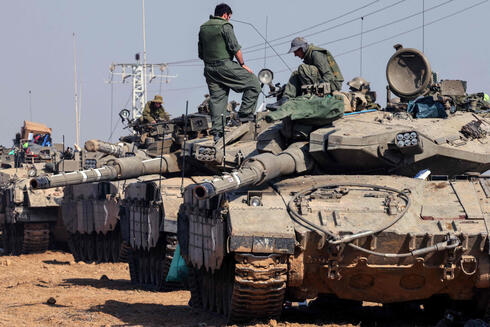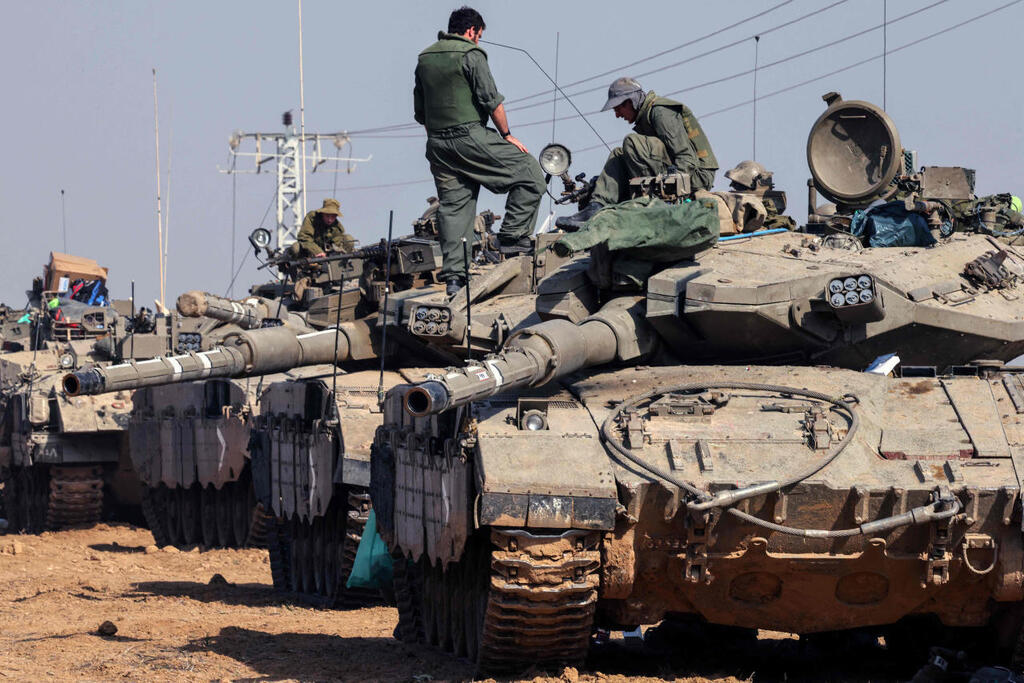
European arms ban could have major impact on IDF
The Dutch court's decision earlier this week to halt the export of replacement parts for the F-35 planes used by the Israeli Air Force may ultimately prove to be no more than a symbolic gesture, but it could also start a snowball effect that leads to much more than a passing headache for Israeli industries
The Dutch court's decision earlier this week to halt the export of replacement parts for the F-35 planes used by the Israeli Air Force was met with relative indifference in Israel and was mainly seen as a symbolic gesture. The spare parts stored in a military base in the south of the Netherlands do not belong to the Netherlands but to the American manufacturer Lockheed Martin and the U.S. Department of Defense. They established regional supply centers in several countries worldwide to transfer necessary spare parts to air forces equipped with their advanced fighter jets, mainly for streamlining export processes.
Lockheed Martin maintains warm relations with the Air Force and the defense establishment. Israel is on the verge of signing with the American government for the purchase of a third squadron of F-35 aircraft, so in the worst case scenario where the Netherlands stops the export of parts, these will be supplied directly from the U.S. These parts are available in the warehouses of the American arms giant, and at least at this stage, it is not apparent that the Dutch court's decision, prompted by a petition from human rights organizations claiming that these planes are allegedly being used for war crimes in Gaza, could ground even one plane.
However, as the war in Gaza continues, the horrific slaughter by Hamas in the Gaza Envelope and in the southern towns on 7/10 is eroding and fading away. The global audience, increasingly affected by the story of Palestinian suffering, once again casts Israel in the role of Goliath. The images of unprecedented destruction in the Gaza Strip, alongside the dramatic story of the influx of homeless refugees and the enormous number of Palestinian civilians killed so far by IDF strikes, may put Israel in a complicated and much more complex situation than a legal decision in the Netherlands, which has negligible meaning.
The irresponsible rhetoric on the part of Prime Minister Benjamin Netanyahu's senior coalition partners is already part of the infrastructure of the case built by South Africa against Israel, and is being conducted at the World Court in The Hague on charges of war crimes in Gaza. The continuation of the bickering, as well as the illusory conference that called for the renewal of Israeli settlement in Gaza, may spur and accelerate more significant processes against Israel from the world's side and complicate its security situation even more.
For example, the EU High Representative for Foreign Affairs, Joseph Burrell, recently called on the international community to reconsider the supply of weapons to Israel. This corresponds with the words of American President Joe Biden from last week about Israel's “over the top” reaction in Gaza. According to Burrell, reducing the amount of weapons that Israel will have will reduce the scope of killings in the Strip.
The fear is that countries will make a decision that the raw materials used by the defense industries will also be in the category of weapons and will limit their exports to Israel. Aluminum, for example, which is used to make missiles or sensors and other means that are integrated into the means of warfare that the defense industries produce.
Israel manufactures its main weapons systems or buys them from the U.S., mainly thanks to the security aid money it provides, which amounts to $3.8 billion a year. These include fighter planes, attack and transport helicopters, refueling planes, and many air-to-ground missiles, some of which penetrate bunkers and are designed to destroy underground targets, such as tunnels and underground command rooms that Hamas built for its terrorists throughout Gaza.
Other major weapon systems, such as tanks and the IDF's APCs, are largely manufactured in Israel. Over 70% of the parts of an Israeli battle tank are components and systems supplied by about 200 Israeli industrial companies. And what about everything else? The tank engines are manufactured in Germany, exported to the USA, and purchased by the Ministry of Defense using aid funds. Germany’s ThyssenKrupp is also the supplier of the submarines and ships used by the Israeli Navy.
Along with these, the defense industries in Israel work around the clock to provide necessary armaments and systems to the IDF, which is fighting in Gaza and is feverishly preparing for an all-out war with Hezbollah in Lebanon. The huge security crisis that Israel has plunged into has caught them with their production lines already full of orders from their customers around the world, who are in the midst of an arms race as part of one of the lessons they drew from the war between Russia and Ukraine.
Sources in the know of the production challenges facing the defense companies fear that calls like those of the European Union's High Representative for Foreign Affairs will result in a snowball effect. Even if the calls for an arms embargo don’t affect the Israel-friendly defense ministries in Berlin and Washington, they may produce much more than a passing headache for Israeli industries.














